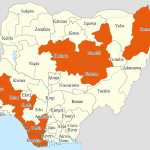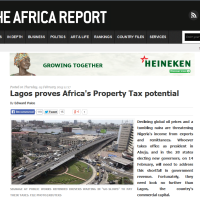The latest buzzword among politicians from all sides in Nigeria is “restructuring”. The governing All Progressives Congress (APC) allegedly established a “restructuring committee” to articulate the party’s position on the issue. But does it make sense to restructure? What does the term really mean? What might a restructured Nigeria look like?
A radical approach would see the existing political arrangement replaced by regional economic and administrative units with minimal federal government interference, emulating the system Nigeria had at independence. A more realistic alternative is for greater powers to be devolved to Nigeria’s 36 states as a way of improving development, governance and economic performance. This was debated in July as part of an ongoing constitutional review process and 24 proposals were voted through by the Senate and House of Representatives. These included a commitment to devolve greater powers to states relating to power generation, railways and youth; ensure the financial autonomy of state legislatures; and strengthen the transparency, administration and financing of Nigeria’s 774 local government authorities. Providing the measures receive approval from two-thirds of Nigeria’s state legislatures they will be passed to the Office of the President for assent.
Nigeria’s states are “hardly considered bastions of governing best practices”, so are they deserving of more powers?
Nigeria’s failing states
Excluding Lagos, Rivers and Delta, the remainder of Nigeria’s 36 states are entirely dependent on the federal government’s monthly allocations for survival. They have completely failed to leverage this income, together with human capital and natural resources, to create economic opportunities for their residents. Weak accountability – state assemblies are mostly little more than rubber stamps for the wishes of the governor – allow those governors to invest federal allocations freely in white elephant projects and patronage. In 2015, poor management of funds, coupled with less federal funding due to lower oil prices, led to 27 states receiving a bailout of ₦662 billion (US$2.1 billion) from the federal government to cover recurrent expenditure.
The performance of state governments on the delivery of certain basic services exclusively mandated as their responsibility in the 1999 Constitution* is far from convincing. Primary education is a glaring example. Almost a third of Nigerian states have youth literacy rates under 40%. In 2016, the World Economic Forum’s Global Competitiveness Index, ranked Nigeria last in primary education while UNICEF believes that Nigeria has the highest number of out of school children – 10.5 million – in the world.
On paper, restructuring Nigeria to empower more decentralised structures may be a good idea. However, the only way it can deliver improvements is simultaneous efforts are made to fix the underlying institutional weaknesses and democratic shortcomings that characterise governance at state and local levels.
Reform before restructuring
If Nigeria continues to have closed political systems where barriers to entries are so high that only the elites can contest for office, then it is hard to imagine how restructuring would lead to state governments becoming more representative of their constituents. The Senate did recently pass a bill to reduce the minimum age required to run for governor and other public offices. It also needs to scrutinise financial barriers to political participation: party nomination forms for governorship races cost as high as ₦10 million (about US$30,000) whilst those looking to be elected to the House of Representatives have to pay ₦2 million (about US$6,000).
Without concerted efforts to bring about more transparent and accountable state assemblies, greater fiscal autonomy is unlikely to improve their performance. Civil society, and increasingly social media platforms, can play an important role in improving this civic engagement but only if they are given the space and opportunity to do so. The recently debated NGO Regulation Bill, which if passed would “regulate and stifle their activities”, is not a positive development in this regard.
The current federal framework has failed to deliver significant improvements in the lives of most Nigerians. However, if restructuring fails to address the institutional underpinnings of economic and political inclusiveness and democratic accountability, the result will not be very different from the current status quo.
Nwamaka Ogbonna is a research analyst working on private sector development in Africa
*Parts 1 and II of the Second Schedule to Nigeria’s 1999 Constitution list federal and state responsibilities in full












